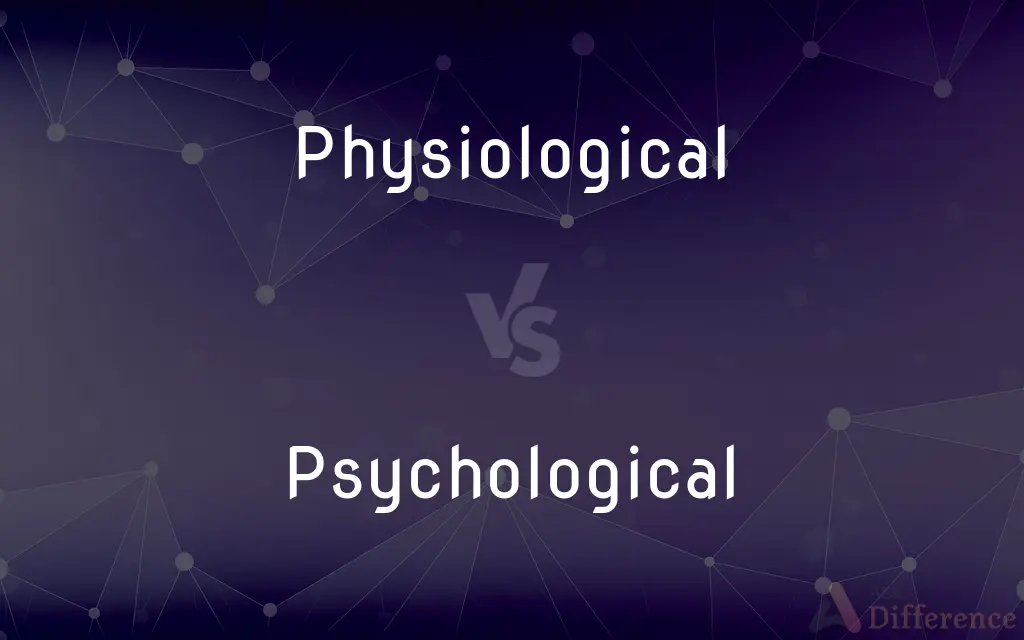Physiological vs. Psychological — What's the Difference?
Edited by Tayyaba Rehman — By Urooj Arif — Updated on March 25, 2024
Physiological relates to the physical and biological functions of living organisms, while psychological pertains to the mental and emotional state, including cognition and behavior.

Difference Between Physiological and Psychological
Table of Contents
ADVERTISEMENT
Key Differences
Physiological aspects concern the body's physical and biological mechanisms, such as heart rate, muscle function, and the nervous system, highlighting how organisms survive and respond to their environment. In contrast, psychological facets delve into the mind, encompassing thoughts, emotions, behaviors, and mental processes, focusing on how individuals perceive, react to, and interact with the world around them.
While physiological processes are often measurable and observable through scientific methods, psychological phenomena can be more subjective, relying on self-reports, observations, and various testing methods to understand mental states and behaviors. On the other hand, psychological studies may involve qualitative assessments, interviews, and behavioral observations to grasp the complexities of mental health, cognition, and social interactions.
The interplay between physiological and psychological aspects is central to fields like psychophysiology and health psychology, which examine how mental states influence physical health and vice versa. Conversely, psychological well-being can impact physiological health, illustrating the complex bidirectional relationship between mind and body.
Physiological health can significantly affect one's psychological state; for instance, hormonal imbalances or neurological disorders can lead to mental health issues. Psychological stress, in turn, can manifest physically, affecting heart rate, immune function, and overall well-being, showcasing the intricate connection between the physical and mental aspects of health.
Comparison Chart
Focus
Physical and biological functions
Mental and emotional states
ADVERTISEMENT
Measurement
Often quantitative (e.g., heart rate, blood pressure)
Often qualitative (e.g., surveys, interviews)
Related Fields
Biology, medicine, neuroscience
Psychiatry, psychology, social sciences
Example Processes
Digestion, respiration, neural signaling
Perception, cognition, emotion regulation
Health Implications
Physical illnesses, genetic disorders
Mental health disorders, cognitive dysfunctions
Compare with Definitions
Physiological
Physiological aspects involve the body's functions and processes that support life.
Studying the physiological response to exercise involves monitoring heart rate and oxygen consumption.
Psychological
Psychological aspects concern the mind and behavior, including thoughts, feelings, and motivations.
Psychological therapy can help address the underlying issues of anxiety and depression.
Physiological
The physiological state can refer to the condition of physical health or bodily functions.
The athlete's peak physiological state was evident through his superior endurance.
Psychological
Psychological well-being is crucial for overall health, encompassing emotional, mental, and social wellness.
Regular exercise has been shown to improve psychological well-being.
Physiological
Physiological measurements are critical in diagnosing and treating physical health issues.
Blood pressure is a key physiological measurement for assessing heart health.
Psychological
Cognitive functions, such as memory and attention, are central to psychological studies.
The study explored the psychological impact of multitasking on cognitive performance.
Physiological
Physiological research often involves understanding how various systems of the body interact.
Her research focuses on the physiological effects of stress on the immune system.
Psychological
Psychological assessments are tools used to understand mental processes and disorders.
Psychological assessments can diagnose learning disabilities and guide interventions.
Physiological
Hormonal changes are an example of physiological processes that affect the body.
Physiological changes during puberty include hormonal shifts that trigger growth spurts.
Psychological
Behavioral patterns can offer insights into psychological states and traits.
His consistent punctuality reflects a psychological predisposition towards orderliness.
Physiological
Of or relating to physiology.
Psychological
Of, affecting, or arising in the mind; related to the mental and emotional state of a person
The victim had sustained physical and psychological damage
Physiological
Being in accord with or characteristic of the normal functioning of a living organism.
Psychological
Of or relating to psychology
Psychological research.
Physiological
Of, or relating to physiology.
Psychological
Of, relating to, or arising from the mind or emotions.
Physiological
Relating to the action of a drug when given to a healthy person, as distinguished from its therapeutic action.
Psychological
Influencing or intended to influence the mind or emotions
Psychological warfare.
Physiological
Of or pertaining to physiology; relating to the science of the functions of living organism; as, physiological botany or chemistry.
Psychological
Of or being any of certain primary colors whose mixture may be subjectively conceived as producing other colors.
Physiological
Of or relating to the biological study of physiology;
Physiological psychology
Pavlov's physiological theories
Psychological
Of or pertaining to psychology.
An inkblot test is a method of psychological evaluation.
Physiological
Of or consistent with an organism's normal functioning;
Physiologic functions
Physiological processes
Psychological
Relating to the mind and behavior or to the mental, emotional, and behavioral characteristics pertaining to a specified person, group, or activity.
I'm concerned about their psychological well-being.
The film was a dark psychological thriller.
Psychological
Without an objective, or reasonably logical foundation.
Prices seem to have stopped rising, having hit the psychological ceiling of just under 100 dollars.
Psychological
Mental or emotional as opposed to physical in nature;
Give psychological support
Psychological warfare
Psychological
Of or relating to or determined by psychology;
Psychological theories
Common Curiosities
What role does psychology play in physical health?
Psychological factors, including stress, attitudes, and behaviors, can greatly impact physical health by affecting physiological processes like immune function and heart health.
Can physiological factors influence psychological states?
Yes, physiological factors such as brain chemistry, hormones, and physical health can significantly influence one's psychological state and mental health.
How does psychological health differ from physiological health?
Psychological health pertains to mental and emotional well-being, including cognitive functioning and emotional regulation, whereas physiological health relates to the physical state of the body.
How are physiological and psychological assessments conducted?
Physiological assessments often involve medical tests and physical examinations, while psychological assessments may use interviews, surveys, and behavioral observations.
What is the significance of understanding the psychological aspects of chronic diseases?
Understanding the psychological aspects of chronic diseases is crucial for comprehensive care, as mental health plays a significant role in disease management, patient outcomes, and quality of life.
What defines physiological health?
Physiological health is defined by the proper functioning of the body's systems and biological processes, free from illness or disorder.
What is psychophysiology?
Psychophysiology is a branch of psychology that studies the relationship between physiological processes and psychological phenomena, exploring how the mind affects the body and vice versa.
Are psychological treatments effective for physiological issues?
Psychological treatments can be effective in managing physiological issues, especially those influenced by stress, behavior, and mental health, such as hypertension and chronic pain.
Can changes in psychological state affect physiological functions?
Changes in psychological state, such as stress or depression, can affect physiological functions, including sleep patterns, immune response, and cardiovascular health.
How do physiological and psychological factors interact in stress responses?
In stress responses, psychological factors perceive a threat, triggering physiological reactions like increased heart rate and hormone release, which then influence further psychological perceptions.
Share Your Discovery

Previous Comparison
In vs. At
Next Comparison
Catholic vs. BaptistAuthor Spotlight
Written by
Urooj ArifUrooj is a skilled content writer at Ask Difference, known for her exceptional ability to simplify complex topics into engaging and informative content. With a passion for research and a flair for clear, concise writing, she consistently delivers articles that resonate with our diverse audience.
Edited by
Tayyaba RehmanTayyaba Rehman is a distinguished writer, currently serving as a primary contributor to askdifference.com. As a researcher in semantics and etymology, Tayyaba's passion for the complexity of languages and their distinctions has found a perfect home on the platform. Tayyaba delves into the intricacies of language, distinguishing between commonly confused words and phrases, thereby providing clarity for readers worldwide.














































